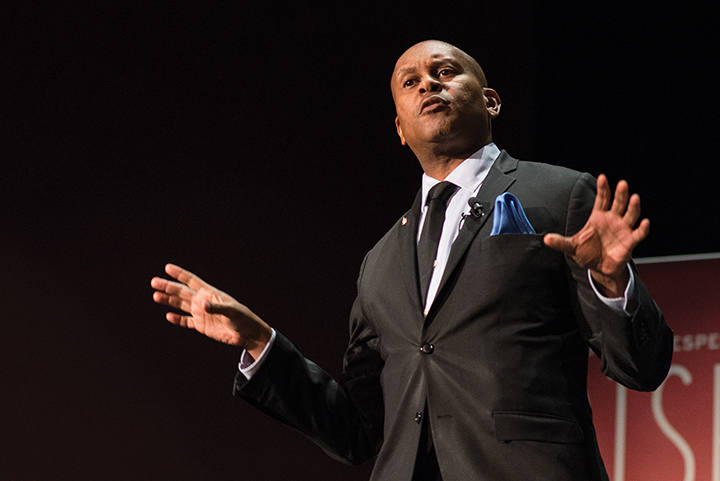When Kevin Powell stepped onto the Rutgers University campus in 1984, he said, it hardly reflected a society decades after the civil rights movement.
The racial injustices he experienced have haunted him since, informing his career and literary works, most recently as he was writing an essay for Utne Reader magazine.
“I cried writing this essay,” he said, stepping away from the podium and casting aside his notes. “By the time it was over, 7,000 words spilled out of me.”
Powell spoke to a crowd of about 200 students and faculty members in Hoff Theater in Stamp Student Union on Tuesday afternoon about the impact his college education had on his future as an activist. He urged current students to be activists in their communities.
“What makes it really rich to me is when the student voices, when young people’s voices are heard,” he said.
The event was part of the Maryland Dialogues on Diversity and Community initiative, a series of conversations addressing inclusivity on the University of Maryland campus and in the surrounding community. The university launched this program in February as a response to ongoing issues of diversity at this university and around the country.
Diversity “is not just about demographics,” university President Wallace Loh said at the event. “It’s also about mutual respect, tolerance, a safe space where people can speak freely and grow.”
More than 50 years after Martin Luther King Jr.’s “I Have a Dream” speech and Brown v. Board of Education, Powell said, racism and discrimination are still very much alive and not much different than they were when he was a student.
“I go to college campuses and students are telling me the same things in the 2000s,” Powell said.
Senior sociology major Rhys Hall introduced Powell by noting that university students recognize this ongoing struggle.
“I’m here to let it be known that in the wake of disagreement and in controversy that students will not be denied,” Hall said.
Powell began his speech by addressing International Women’s Day and spoke of different forms of inequality throughout the event, alluding to discrimination on the basis of race, gender, sexual orientation and income.
He also spoke about the police-involved deaths of Freddie Gray, Sandra Bland and Eric Garner, explaining that these injustices were opportunities for activism and insight into the disturbing culture of America.
“How many of these conversations we got to have before anything actually changes?” Powell said.
Loh, who spoke before Powell, agreed that the recent deaths were calls to action.
“The events of the past year, year-and-a-half … involve some uncomfortable truths about our country,” he said.
Powell challenged the audience to push beyond headline news and current events to understand the history of racism in America.
“A lot of us will call ourselves Americans [when] we don’t even know anything about America,” he said. “When you don’t deal with the history, you’re doomed to repeat it all over again.”



